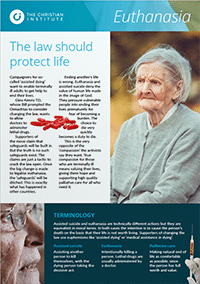A senior doctor has come under fire for saying medics should be able to assist terminally ill patients in killing themselves.
Professor John Ashton, President of the Faculty of Public Health, called for doctors to be legally allowed to “speed things up a bit” for people who are dying, by giving them a lethal dose of drugs.
But The Christian Institute has described Prof Ashton’s comments as “frightening” for the sick and vulnerable.
Discomfort
Speaking to the Guardian newspaper in a personal capacity, Prof Ashton, who is a humanist, said, “we need an equivalent of a midwife at the end of life”.
“All over the country people are spending their last days and weeks in major discomfort because their medical carers are not willing to accept that it’s the end of the line and to give them the necessary sedation to just speed things up a bit.”
He claimed that a significant proportion of people would “like to feel confident that if it came to the crunch they could call on their doctor to help them out”.
Personal
“Personally, I would like that for myself if I was in this position”, Prof Ashton added.
Prof Ashton courted controversy last year by calling for the age of consent to be lowered to 15. He has also shown support for the total legalisation of drugs.
Responding to his latest comments, spokesman for The Christian Institute Simon Calvert said: “It is always shocking when a doctor crosses the boundary from talking about how to treat patients to how to kill them.
“He may be speaking in a private capacity, but members of the public will be anxious to hear a senior figure in the medical establishment talking in this way.
Vulnerable
“It is frightening for sick and vulnerable people. Why is our country devoting so many conference speeches and column inches to debating euthanasia, when we could be focusing on cures and palliative care?”
A Bill that is seeking to change the law to allow terminally ill patients to obtain lethal drugs to kill themselves is currently in the House of Lords.
The Bill, tabled by Lord Falconer, has its second reading in the House of Lords on 18 July.
Consequences
The Roman Catholic Bishop of Shrewsbury has criticised the proposals, warning that it would be “impossible to predict” the consequences.
Bishop Mark Davies said in a pastoral letter: “It is far from compassionate to remove the legal protections provided for some of the most vulnerable members of society.”


